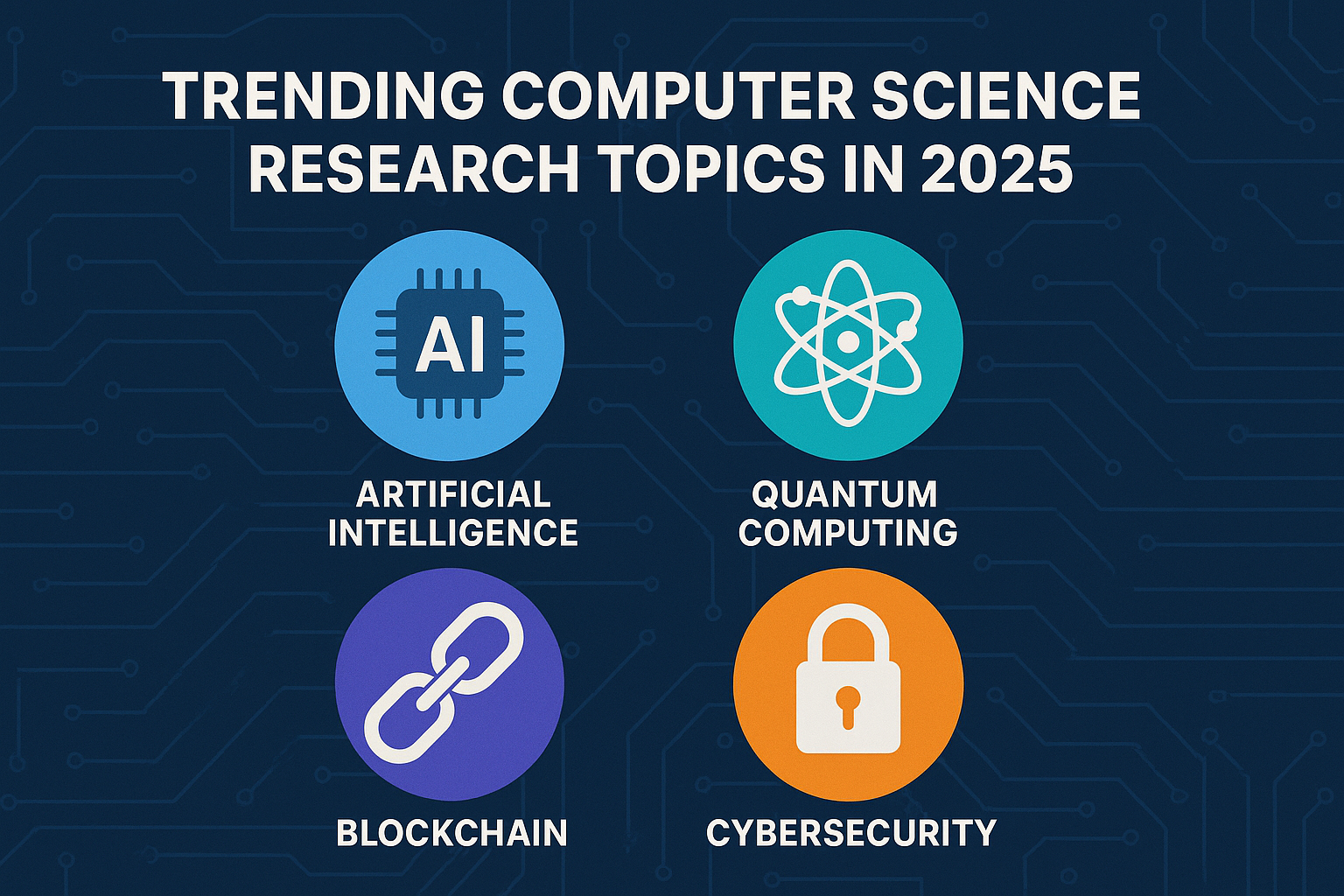The year 2025 marks a transformative phase in the world of computer science research. As we dive deeper into the digital era, groundbreaking innovations are reshaping how we live, work, and connect. From the rise of artificial intelligence (AI) to the real-world adoption of quantum computing, the technological landscape is evolving at a pace never seen before.
In 2025, key research areas in computer science are not just academic interests – they’re directly influencing global industries and society at large. Fields such as cybersecurity, edge computing, decentralized systems, and API standardization are at the forefront of this transformation. These technologies are driving the development of intelligent systems, redefining data security, and powering the next wave of computing infrastructure.
Here’s a comprehensive look at the most trending computer science research topics in 2025 and why they matter.
1. Artificial Intelligence (AI) and Large Language Models (LLMs)
Focus Areas: Generative Models, Ethics, and Intelligent Automation
AI continues to dominate research agendas worldwide. In 2025, nearly 18% of all computer science papers incorporate AI tools in some capacity – whether for drafting content, analyzing data, or automating processes. The explosive rise of large language models (LLMs) like ChatGPT, GPT-4o, and Google’s Gemini 2.0 has fueled new discussions around performance, reasoning, and ethical implications.
Why It’s Trending
- Multimodal Capabilities: Modern LLMs now interpret text, audio, and images in real-time, enabling applications in education, entertainment, and personalized medicine.
- Generative AI Applications: Tools like GPT-4o are revolutionizing creative industries by generating high-quality text, music, and visual content.
- Ethical Considerations: Concerns over AI bias, privacy violations, and accountability are intensifying. For instance, AI in recruitment tools has been criticized for reinforcing historical biases.
- Legislation Impact: The EU AI Act (enforced in August 2024) requires transparency and ethical use of AI, sparking interest in explainable AI (XAI) methods like SHAP and LIME.
Popular Subtopics
- Autonomous Decision-Making: Who is responsible when self-driving cars crash or when loan applications are denied by an algorithm?
- AI in Healthcare: AI assists in early disease detection, such as identifying breast cancer with 99% accuracy, and supports robotic surgeries using systems like da Vinci, particularly in high-volume hospitals across Asia.
- Bias Mitigation Techniques: Innovations include data debiasing, fair sampling, and counterfactual reasoning to train fairer models.
2. Quantum Computing
Focus Areas: Quantum Supremacy, Hybrid Models, and Real-World Applications
Quantum computing is no longer just a theoretical frontier – it’s entering real-world testing and early deployment. Tech giants like IBM, Google, and NASA have already demonstrated breakthroughs in quantum supremacy, solving tasks that are impossible for traditional computers.
Why It’s Trending
- Drug Discovery: Quantum algorithms are accelerating pharmaceutical research by simulating complex molecular behavior.
- Post-Quantum Cryptography: As quantum machines evolve, they pose threats to traditional encryption systems like RSA, prompting a surge in research on quantum-resistant algorithms.
- AI and Quantum Fusion: Hybrid models that combine quantum mechanics with machine learning, such as TinyGPT-V, are opening new doors in AI efficiency.
Key Challenges
- Scalability: Qubits are highly sensitive to environmental factors, making them unstable and difficult to manage at scale.
- Cost and Accessibility: The expense of building quantum infrastructure limits its use to well-funded institutions and companies.
3. Cybersecurity and Zero Trust Architecture
Focus Areas: AI-Powered Defense and Trustless Security Models
With the rise of remote work and global connectivity, cybersecurity has never been more critical. In 2025, companies face an average data breach cost of $3.86 million, emphasizing the need for smarter, AI-enhanced defenses.
Why It’s Trending
- Zero Trust Security: A “never trust, always verify” approach is replacing traditional network security models. This includes tools like multi-factor authentication (MFA), endpoint detection and response (EDR), and identity-based access control.
- Blockchain Security: Despite billions lost to crypto fraud in 2024, tools like Chainalysis and Hexagate are emerging to trace illicit crypto transactions and detect vulnerabilities in smart contracts.
Ethical and Legal Debates
- Privacy vs. Surveillance: Governments worldwide are deploying AI for public surveillance, raising critical questions about privacy, civil liberties, and regulatory oversight.
4. Edge Computing
Focus Areas: Real-Time Processing and IoT Integration
The demand for low-latency applications – such as smart vehicles, industrial automation, and Internet of Things (IoT) devices – is driving a shift from centralized cloud computing to decentralized edge networks.
Why It’s Trending
- Performance and Speed: By processing data closer to the source, edge computing minimizes delays and reduces bandwidth use.
- Market Growth: The edge computing market is forecasted to reach $61.14 billion by 2028, with companies like Cloudflare already managing over 10% of global web traffic via edge networks.
5. API Standardization
Focus Areas: Developer Productivity and Interoperability
As software ecosystems grow more complex, the need for seamless data exchange and modular architecture is critical. This has led to widespread adoption of API standards like OpenAPI and GraphQL.
Why It’s Trending
- Efficiency: GraphQL solves REST’s common issue of over-fetching data by allowing clients to request only what they need.
- Automation: OpenAPI enables developers to automatically generate documentation, test cases, and mock servers, speeding up the development lifecycle.
- Ideal for Microservices: API-first design improves scalability and compatibility in microservices and mobile-first applications.
The Path Ahead for Computer Science in 2025
The computer science research landscape in 2025 reflects a powerful blend of innovation, responsibility, and disruption. From the ethical design of AI systems to the practical implementation of quantum computing and Zero Trust cybersecurity, the field is evolving in profound ways.
As researchers and developers continue to explore new frontiers, collaboration between industry, academia, and government will be essential. Addressing challenges like algorithmic bias, quantum instability, and data privacy will require shared accountability and visionary leadership.
In a world increasingly powered by code, these trending research topics are more than academic – they’re the building blocks of tomorrow’s digital society.

Comments are closed.